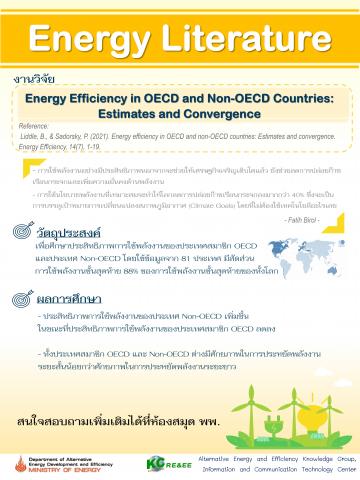Energy Efficiency in OECD and Non-OECD Countries: Estimates and Convergence
Energy Efficiency in OECD and Non-OECD Countries: Estimates and Convergence
Abstract
Improvements in energy efficiency are essential for reducing CO2 emissions, reducing energy consumption, and increasing energy security. This paper uses stochastic frontier analysis applied to a large panel data set of 81 OECD and non-OECD countries covering the years 2000 to 2013 to estimate energy efficiency. Non-OECD energy efficiency has been increasing across the time period under study while OECD energy efficiency has been declining. On average, 3% of global energy consumption can be saved by reducing transient inefficiencies but this can represent a lot of energy saved when accumulated across time. Much larger global energy savings can be obtained by reducing persistent energy inefficiency. Sigma convergence of energy efficiency (a reduction in the dispersion of energy efficiency across countries) is investigated. There is not much evidence to support energy efficiency sigma convergence. Sigma divergence and energy efficiency reductions make it more difficult to negotiate international treaties on energy efficiency and climate change.
Reference: Liddle, B., & Sadorsky, P. (2021). Energy efficiency in OECD and non-OECD countries: Estimates and convergence. Energy Efficiency, 14(7), 1-19.
บทคัดย่อ
การปรับปรุงประสิทธิภาพการใช้พลังงานเป็นสิ่งสำคัญในการลดการปล่อยก๊าซคาร์บอนไดออกไซด์ (CO2) ลดการใช้พลังงาน และเพิ่มความมั่นคงด้านพลังงาน ในการประเมินประสิทธิภาพการใช้พลังงานงานวิจัยฉบับนี้ได้นำเอาวิธีการประมาณค่าแบบ stochastic frontier มาใช้กับชุดข้อมูลขนาดใหญ่ของประเทศสมาชิกองค์การเพื่อความร่วมมือทางเศรษฐกิจและการพัฒนา (OECD) และประเทศที่ไม่ใช่สมาชิก OECD จำนวนรวมทั้งสิ้น 81 ประเทศ โดยใช้ข้อมูลช่วงปี ค.ศ. 2000-2013 ประกอบการประเมิน ผลการประเมินพบว่า ประสิทธิภาพการใช้พลังงานของประเทศที่ไม่ใช่สมาชิก OECD เพิ่มขึ้นตลอดระยะเวลาในช่วงปี ค.ศ. 2000-2013 ในขณะที่ประสิทธิภาพการใช้พลังงานของประเทศสมาชิก OECD ลดลง การลดความไร้ประสิทธิภาพในการใช้พลังงานชั่วคราวสามารถประหยัดพลังงานทั่วโลกได้ประมาณ 3% โดยเฉลี่ย แสดงให้เห็นถึงการประหยัดพลังงานจำนวนมากตลอดช่วงระยะเวลาที่ได้ทำการศึกษา ทว่าหากเราลดความไร้ประสิทธิภาพในการใช้พลังงานลงอย่างถาวร โลกเราจะสามารถประหยัดพลังงานได้มากยิ่งขึ้น นอกจากนี้ งานวิจัยฉบับนี้ยังได้ศึกษาการลดน้อยลงของการกระจายประสิทธิภาพการใช้พลังงานระหว่างประเทศ ปรากฏว่ายังไม่มีหลักฐานในการสนับสนุนเรื่องดังกล่าวมากนัก ซึ่งทำให้การเจรจาสนธิสัญญาระหว่างประเทศเกี่ยวกับประสิทธิภาพการใช้พลังงานและการเปลี่ยนแปลงสภาพภูมิอากาศทำได้ยากยิ่งขึ้น

